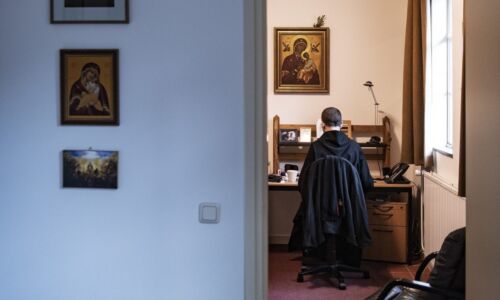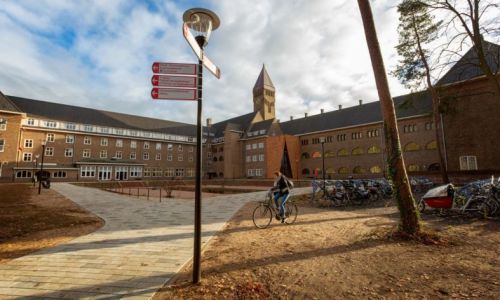50 plus and back in class
-
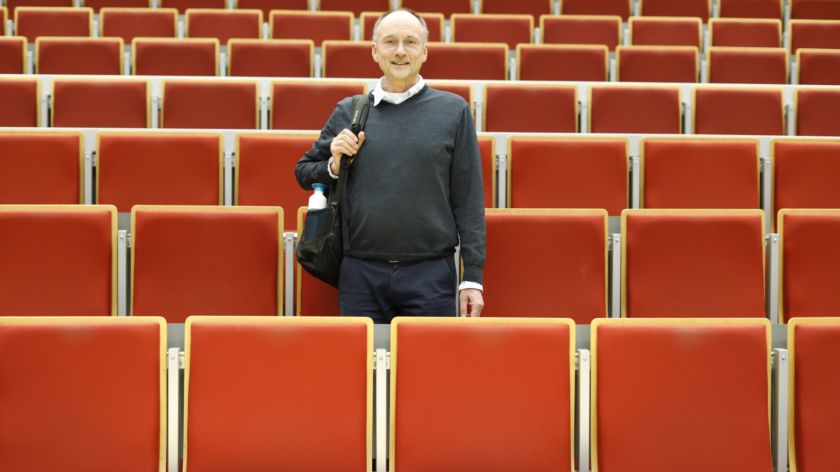 Huub Vromen. Photos: Duncan de Fey
Huub Vromen. Photos: Duncan de Fey
In the distant past, these students already attended university, but now they are back. Chantal, Frans and Huub are over 50, but are back in the classroom. 'For my first exam in thirty years, I was really nervous.'
‘I STUDY PURELY OUT OF INTEREST’
Huub Vromen, bachelor student in philosophy (66):
‘I retired last year and one day later, I was in class. I studied math in Nijmegen once. It wasn’t my plan to become a teacher, but I rolled into it and it turned out to be so much fun that I kept on doing it. But I always studied next to it. First in a management premaster and master programme at Open University, and later I took some law courses. At Open University, you always study alone and that gets lonely. I wanted to be in a classroom again, and I wanted to enrol in a programme out of interest, not out of the will to apply it in a work environment. The same reason that I started studying math, basically. At the beginning, I was a bit nervous about being amongst all these young students, but it has turned out great. The contact inspires me. I am still in contact with last year’s group. The study costs more time than I had expected. When it comes to that, it is a fulltime job. My memory is not as good as it used to be when I was younger, but I think my understanding is better. On top of that, philosophy interests me even more than I expected. In my last job, director of school group Rijk van Nijmegen, I was leading eight hundred people, now I study for myself. I finished the premaster already, but I want to take some more classes. And after this? It would be nice to do another master. Maybe in Amsterdam, because the programme there contains a lot of language philosophy and logic. But: it is so expensive. Taking more law classes also appeals to me. But to quit studying is not an option.’
‘IT IS AWFUL WHEN THEY ADDRESS ME FORMALLY’
Chantal Huijgen (55), master student spiritual care at religion sciences:
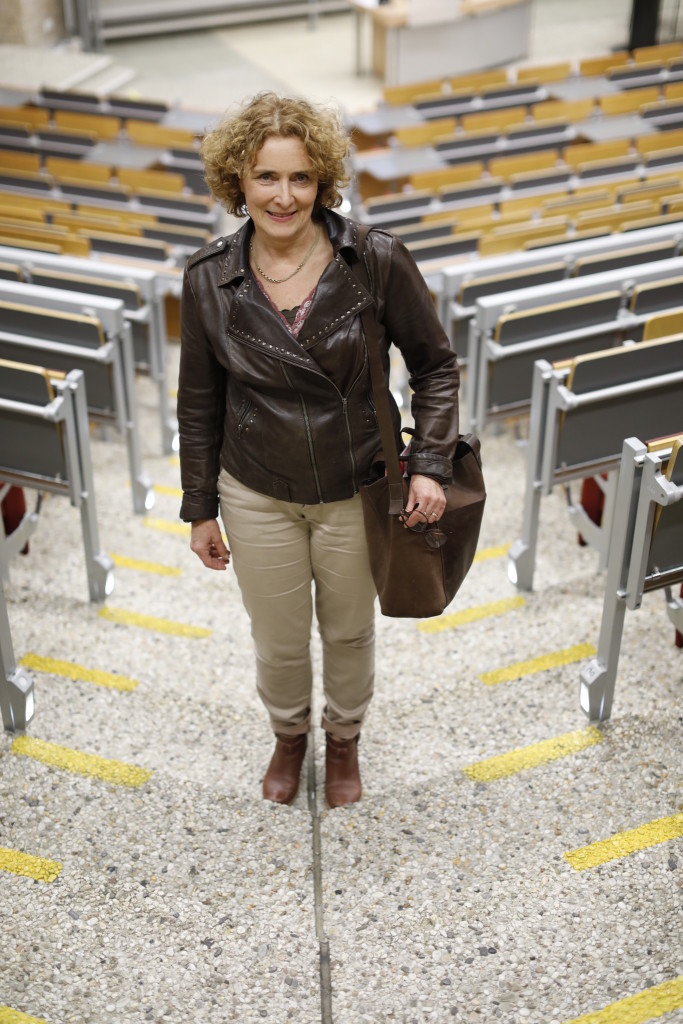
‘My daughters are used to me studying, they have never known me differently. When I am too enthusiastic about it at the dinner table, they try to stop me: ‘mom, cut it out!’ They are attending university themselves right now. If you would have told me ten years ago that I would be doing my master right now, I would have laughed in your face. I was doing a study programme at the liberal protestants at the time, through which I ended up with a college diploma. The subject I liked the most, was spiritual care. Even though I always thought healthcare would not be for me. I was working in PR and communication. My husband said: ‘I just thought you were going to take one course for fun’. And now I am enrolled in a master programme here at the university, next to my job in geriatrics, as coordinator spiritual care. I was looking for more depth and I found that here. For me, it is an extra dimension to be amongst young people. It is awful when they address me formally, but luckily, that almost never happens. During the clinical research methods class, you have to write a research proposal. And around me, I see everybody handing in these refreshing down to earth proposals. I love it. I like the open mind they have, they are not limited by life experience. Sometimes, my fellow students say: ‘but you know how it works, you have a job already. Like I know everything. Well, I do not. When I started studying art history at eighteen, I hated the real academic parts of it. I like doing things, I wanted to practical. Now, I think it is all so interesting! I did not expect that of myself.’
‘EVEN THE TEACHERS ARE YOUNGER THAN ME’
Frans Nies (60), third-year student art history:
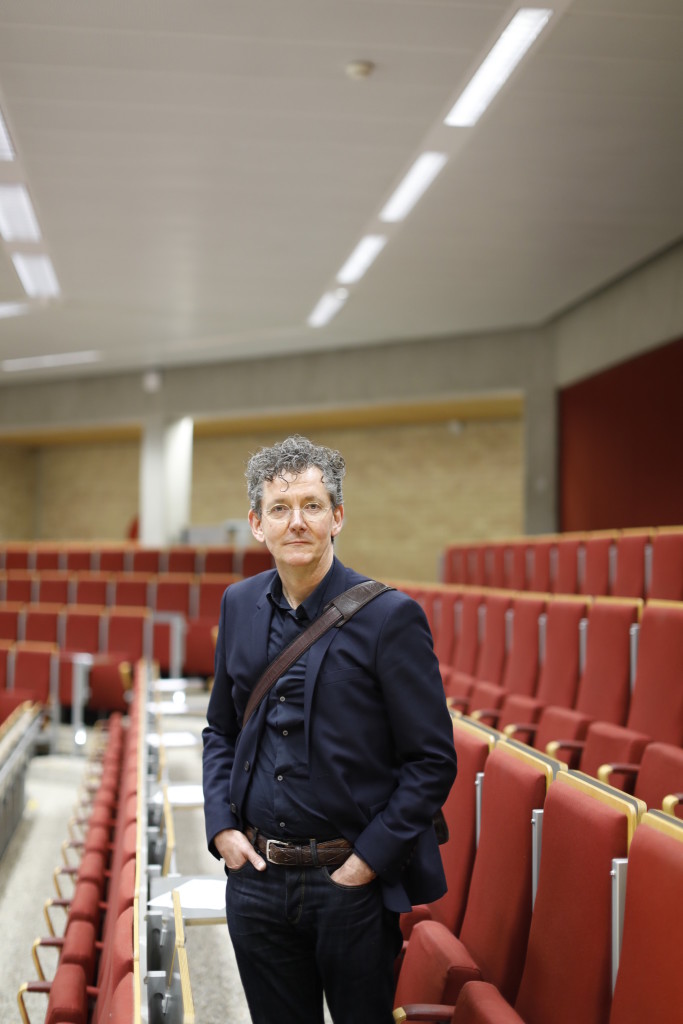
‘As an older student, you are a bit of an outsider. Even the teachers are younger than me. I am trying not to change. I do not want to impose myself during classes: I used to hate it when the older student kept on raising his hand. I just got back from the fourth long excursion in the programme. This time, it was a nine-day-long trip watching cathedrals in South England. If you are on the road with a group for so long, a lot of barriers are taking down. But the age different is there, and you shouldn’t deny that. Luckily, art history has a lot of excursions. That helps with getting to know each other. Because I had the possibility to stop working, I got the change to go back to university. I chose art history because it has been my passion for a long time now. And when a teacher recommends a book, why would I not read it? For young students, the interest in their subject grows during the programme. For me, it has been there from the start. For my first exam in thirty years, I was really nervous. By now, I am more confident: I know I can do it. This year, I want to finish my bachelor programme. After that, I want to enrol in a master programme. No, not a research master, it is hard to get a spot there. I do not want to get in the way of a young student. But after the master, I still want to continue, maybe with a publication, maybe as an outside PhD candidate.’

